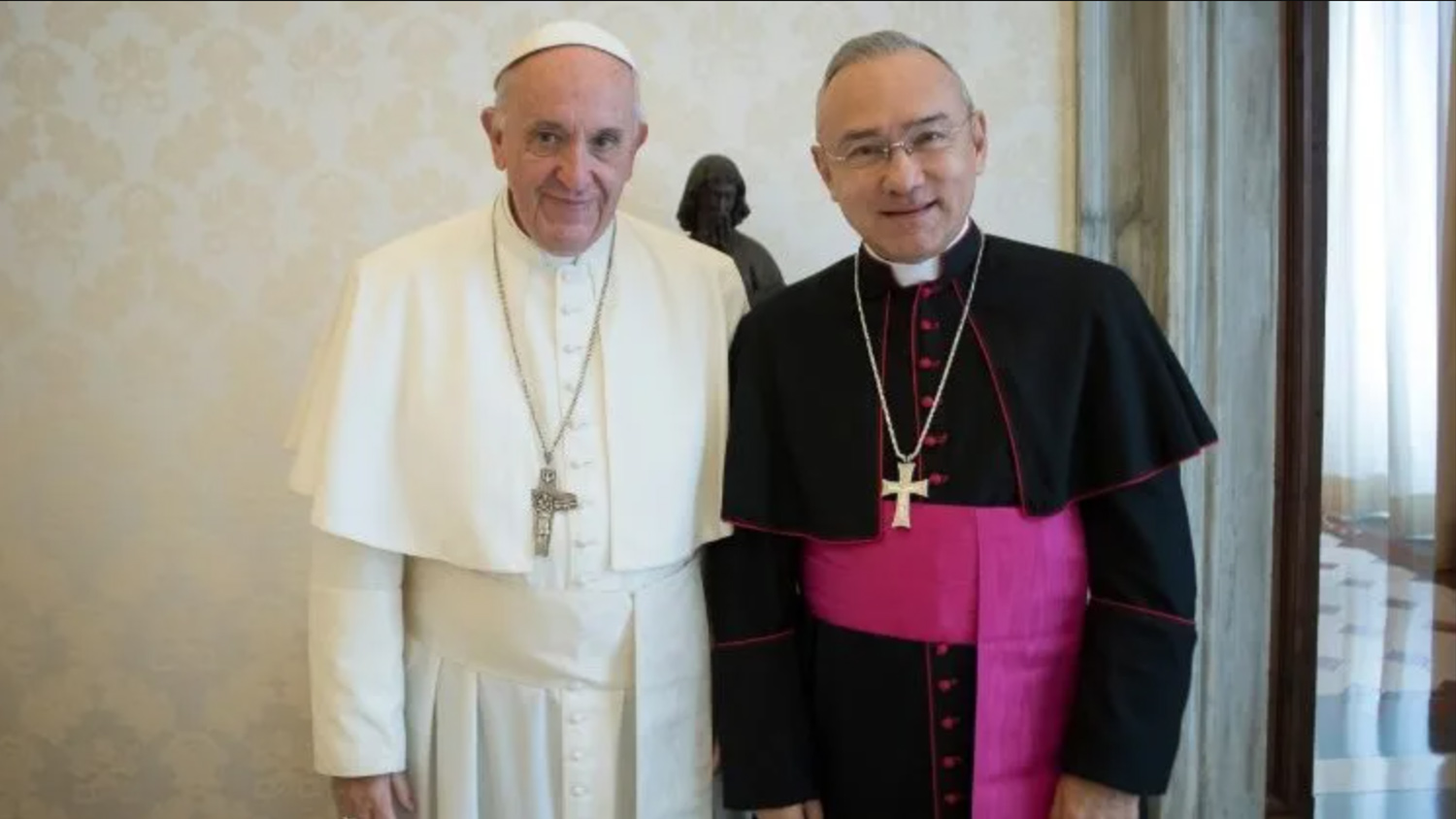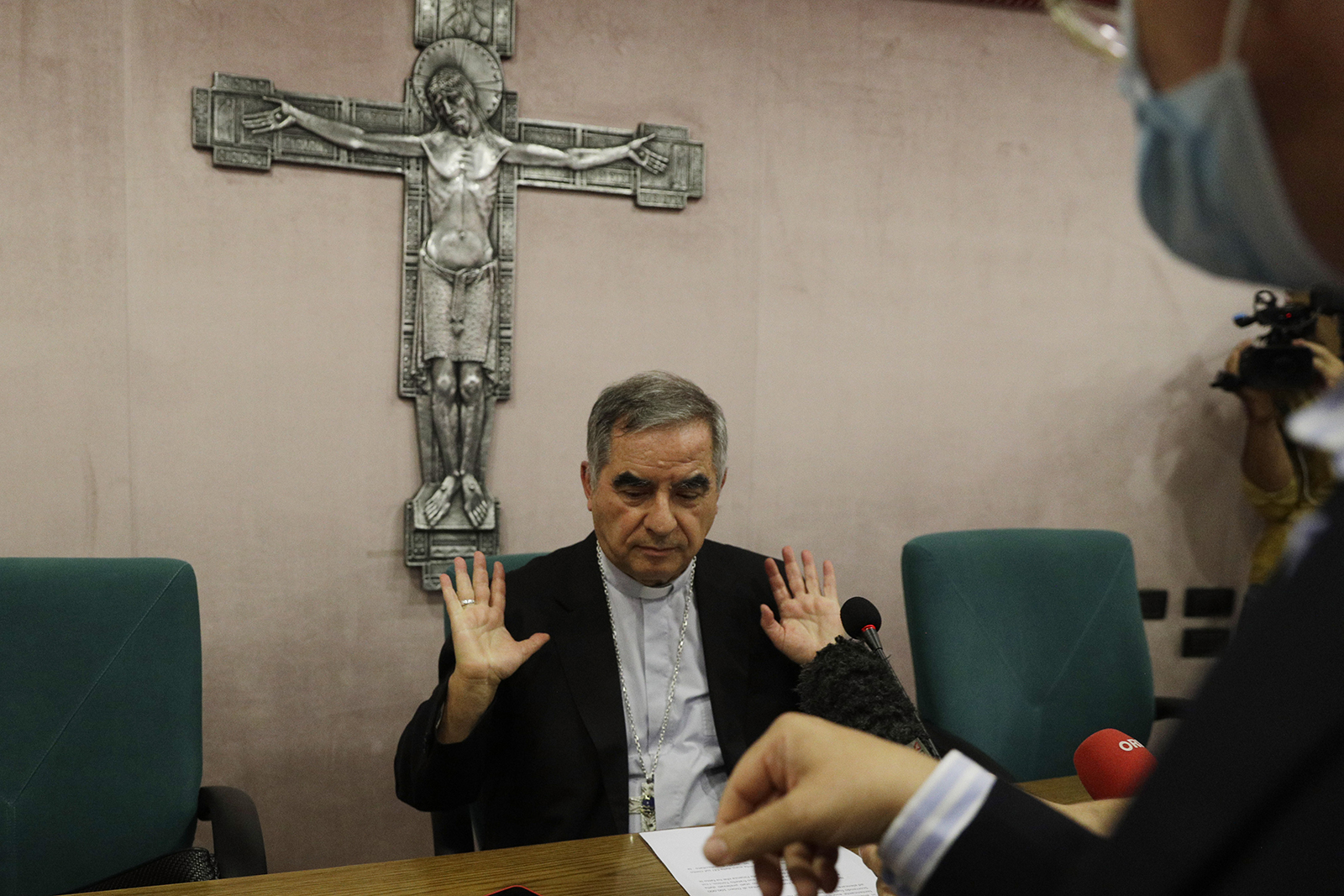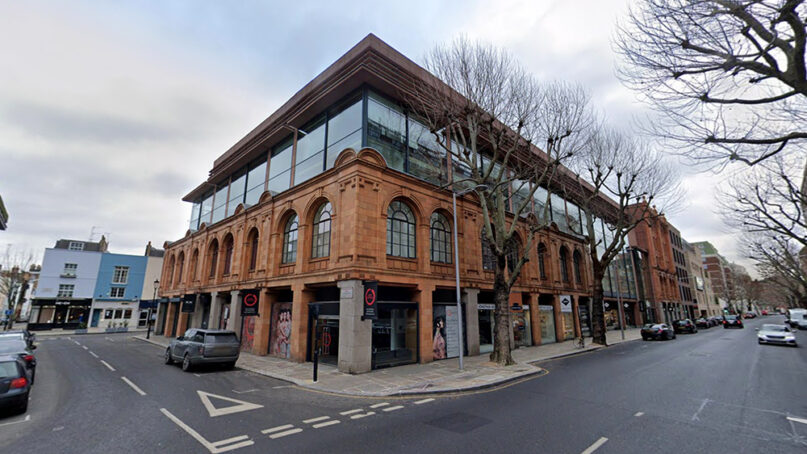ROME (RNS) — Testifying at a Vatican trial, Venezuelan Archbishop Edgar Peña Parra, the Vatican substitute, an equivalent of a papal chief of staff, compared the events leading to the failed London property deal with Jesus’ agonizing march toward crucifixion.
On the 51st session of the Vatican trial into the controversial property deal, Peña Parra, who is the highest ranking official yet to testify, said the Vatican was ultimately deceived by Gianluigi Torzi, an Italian broker who is accused of defrauding the Vatican of millions.
“Torzi had the power, and we couldn’t do it any other way,” said Peña Parra Thursday (March 16). He then described it as a “Via Crucis, indeed a double Via Crucis. If the Lord fell three times, we fell six times.”
At the trial, Peña Parra answered questions for more than four hours from both prosecutors and defense lawyers regarding his role in the Vatican’s withdrawal from the controversial property deal, which he inherited after he succeeded Cardinal Angelo Becciu as Vatican chief of staff in 2018.
Becciu, who resigned the privileges of cardinal in 2020, is among the 10 defendants in the trial accused of financial malfeasance.
Peña Parra said he was informed about the dire circumstances of the deal by Monsignor Alberto Perlasca, the former head of the administrative office of the Vatican Secretariat of State, who went from prime suspect to the Vatican prosecution’s star witness in the case.
It was Perlasca, the Venezuelan prelate told the court, who signed the Framework Agreement and the Share Purchase Agreement — despite lacking the authority or authorization to do so — that led to Torzi’s ownership of the property’s controlling shares.
In 2014, the Vatican had invested $200 million in the property, belonging at the time to the Italian investor Raffaele Mincione. Four years later, with Torzi serving as middleman, the Vatican purchased 30,000 non-voting shares of the property. However, Torzi held onto 1,000 controlling shares and then asked the Vatican to fork over more than $17 million for his shares, as well as for his role in brokering the deal.

Pope Francis, left, with Archbishop Edgar Peña Parra in 2018. (Photo by Vatican News)
In his testimony, Peña Parra said that in a meeting with Pope Francis, along with two lawyers, it was clear the whole affair was a “deception,” and he was instructed by the pope to get out of the deal “and lose as little money as possible.”
Nevertheless, he said, in 2019, the Vatican had no choice but to pay Torzi 15 million euro in two installments of 10 million euro and 5 million euro. However, after making the payments, Vatican prosecutors accused the broker of blackmail and, in 2020, held Torzi for interrogation for 10 days before releasing him.
“We were forced to. It was truly painful for me to see that we still had to give money for this matter,” Peña Parra said.
Peña Parra’s cross-examination continued March 17, and he was asked for more details regarding the property deal, including by lawyers representing the Vatican Bank and the Secretariat of State, who are civil parties in the case.
However, at the start of the 52nd session, a statement by Becciu was presented to the court in which he blasted the prosecution’s characterization of him.
During the trial’s March 8 session, the Vatican’s chief prosecutor, Alessandro Diddi, presented the court with several letters between Francis and Becciu, in which the cardinal had pleaded with the pontiff to back his version of events and drop charges of financial malfeasance against him.
Becciu also asked the pope to confirm he had endorsed the 2014 purchase and subsequent sale of the London real estate property.
“I should cite you as a witness in the trial, but I would not allow myself to do so,” the cardinal wrote to Francis in a letter dated July 24, 2021.
In another letter, the pope referenced a previous request by Becciu that Francis confirm he had authorized payments to Cecilia Marogna, a self-styled security analyst who is also on trial, that he said were used to negotiate the release of a Colombian nun held hostage in Mali.
Marogna, who is charged with embezzlement, was paid exorbitantly for advising Becciu and used the payments to buy expensive designer bags and furniture, according to prosecutors.

Cardinal Angelo Becciu talks to journalists during a news conference in Rome, in this Sept. 25, 2020, file photo. (AP Photo/Gregorio Borgia)
In his statement to the court, Becciu said the letters were “intended to remain strictly private, especially because (they) contained details regarding the humanitarian operation that I felt should remain confidential for the protection of the Holy See and international relations.”
He also took issue with Diddi’s characterization that the Italian cardinal was trying to manipulate the pope in order to drop the charges.
“Firmly and with my head held high, I affirm: I am not a manipulator. In my life, I have never manipulated anyone, much less the Holy Father,” Becciu wrote.
Becciu also said Diddi did not present another letter that would have provided further context. According to the cardinal, in a 2021 phone call, Francis asked him “to put in writing what I felt needed to be stated in order to represent the truth.
“Mind you, it was not I who proposed this, but it was he (Francis) who requested that I formalize such information in writing. So I did, the following day, with a letter,” which he said was dated July 20, 2021.
“It is enough to read that first letter, which the pope acknowledged, to have full confirmation of this. A letter which the prosecutor did not deposit and which I am therefore obliged to deposit myself, for the sake of truth.”
Diddi had presented a letter dated July 21, 2021, from Francis, in which the pontiff expressed “surprise” at Becciu’s request for the two statements.
However, the cardinal alluded that the pope’s response may have been written by someone else.
“I noticed a style and terminology not usual for the Holy Father, whose tones I know well from my five years of constant collaboration as substitute,” Becciu said.
“I really could not understand what was going on. Also, in reading the second letter, the one dated July 26, 2021, I was even more bewildered, because I did not recognize the Holy Father in those few lines. The content was far from what we had discussed,” he said.





